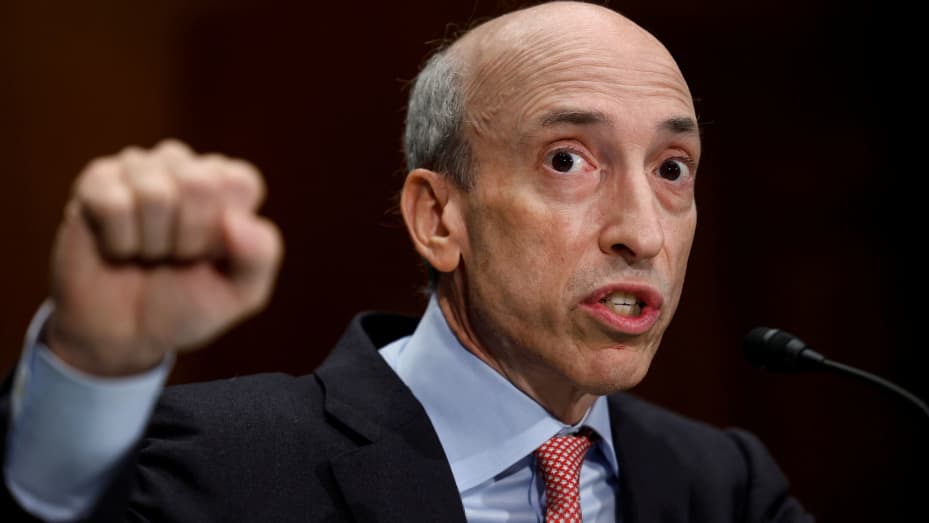- SEC chair Gary Gensler proposed amending federal custody requirements, expanding the rules to include assets like crypto, a change that would require crypto exchanges to gain further regulatory approval.
- The proposed changes would mandate custodians, including crypto exchanges, secure or maintain certain federal or state registrations, even as regulators are both increasing scrutiny on crypto companies and making it more difficult to secure regulatory approval for crypto products.
The Securities and Exchange Commission voted 4-1 on Wednesday to propose sweeping changes to federal regulations that would expand custody rules to include assets like crypto and require companies to gain or maintain registration in order to hold those customer assets.
The proposed amendments to federal custody rules would “expand the scope” to include any client assets under the custody of an investment advisor. Current federal regulations only include assets like funds or securities, and require investment advisors, like Fidelity or Merrill Lynch, to hold those assets with a federal- or state-chartered bank, with a few highly specific exceptions.
It would be the SEC’s most overt effort to rein in even regulated crypto exchanges that have substantial institutional custody programs serving high-net-worth individuals and entities which custody investor assets, like hedge funds or retirement investment managers.

The move poses a fresh threat to crypto exchange custody programs, as other federal regulators actively discourage custodians like banks from holding customer crypto assets. The amendments also come as the SEC aggressively accelerates enforcement attempts.
While the amendment doesn’t specify crypto companies, Gensler said in a separate statement that “though some crypto trading and lending platforms may claim to custody investors’ crypto, that does not mean they are qualified custodians.”
Under the new rules, in order to custody any client asset — including and specifically crypto — an institution would have to hold the charters, or qualify as a registered broker-dealer, futures commission merchant, or be a certain kind of trust or foreign financial institution.
SEC officials said that the proposal would not alter the requirements to be a qualified custodian and that there was nothing precluding state-chartered trust companies, including 币库 or Gemini, from serving as qualified custodians.
The officials emphasized that the proposed amendments did not make a decision on which cryptocurrencies the SEC considered securities.
The amended regulation would also require a written agreement between custodians and advisors, expand the “surprise examination” requirements, and enhance recordkeeping rules.
The SEC had previously sought public feedback on whether crypto-friendly state-chartered trusts, like those in Wyoming, were “qualified custodians.”
“Make no mistake: Today’s rule, the 2009 rule, covers a significant amount of crypto assets,” Gensler said in a statement. “As the release states, ‘most crypto assets are likely to be funds or crypto asset securities covered by the current rule.’ Further, though some crypto trading and lending platforms may claim to custody investors’ crypto, that does not mean they are qualified custodians.”
But Gensler’s proposal seemed to undercut comments from SEC officials, who insisted the moves were designed with “all assets” in mind. The SEC chair alluded to several high-profile crypto bankruptcies in recent months, including those of Celsius, Voyager, and FTX.
“When these platforms go bankrupt—something we’ve seen time and again recently—investors’ assets often have become property of the failed company, leaving investors in line at the bankruptcy court,” Gensler said.
The proposed changes by the SEC are also intended to “ensure client assets are properly segregated and held in accounts designed to protect the assets in the event of a qualified custodian bankruptcy or other insolvency,” according to material released by the agency on Wednesday.
Coinbase already has a similar arrangement in place. In its most recent earnings report, the exchange specified that it keeps customer crypto assets “bankruptcy remote” from hypothetical general creditors, but noted that the “novelty” of crypto assets meant it was uncertain how courts would treat them.
The SEC has already begun to target other lucrative revenue streams for crypto institutions like Coinbase, which is the only publicly traded pure crypto exchange in the U.S. Last week, the SEC announced a settlement with crypto exchange Kraken over its staking program, alleging it constituted an unregistered offering and sale of securities.
At the time, Coinbase CEO Brian Armstrong said a potential move against staking would be a “terrible path” for consumers.
Coinbase reported $19.8 million in institutional transaction revenue and $14.5 million in custodial fee revenue for the three months ending Sept. 30, 2022. Together, that institutional revenue represented about 5.8% of Coinbase’s $590.3 million in revenue for that same time period. But that percentage does not include any revenue from blockchain rewards or interest income from institutional custody clients.
“Coinbase Custody Trust Co. is already a qualified custodian, and after listening to today’s SEC meeting, we are confident that we will remain a qualified custodian even if this proposed rule is enacted as proposed,” Coinbase chief legal officer Paul Grewal said. “We agree with the need for consumer protections — as a reminder, our client assets are segregated and protected in any eventuality.”
Grayscale Bitcoin Trust (GBTC), for example, custodies billions of dollars worth of bitcoin using Coinbase Custody, holding roughly 3.4% of the world’s bitcoin in May 2022.
In the aftermath of the SEC’s approval vote, comments from commissioners made it unclear what the full extent of the SEC’s proposed rulemaking would be, and how it could impact existing partnerships. Grayscale is not a registered investment advisor, and so under the proposed amendments would not apparently face any material impact to their custody arrangement.
A person familiar with the matter did not expect the relationship would be adversely affected, noting Coinbase Custody’s qualified custodian status as a New York state-chartered trust, and observing that investment advisors might even transition from directly holding bitcoin to owning GBTC shares as a result of the proposed amendments.
Within the commissioner’s ranks, there was dissent and questions over the nature of the proposed rules. “The proposing release takes great pains to paint a “no-win” scenario for crypto assets,” SEC commissioner Mark Uyeda said. “In other words, an adviser may custody crypto assets at a bank, but banks are cautioned by their regulators not to custody crypto assets.”
But Uyeda also noted that the proposal was a move towards rulemaking, rather than what he called a historic use of “enforcement actions to introduce novel legal and regulatory theories.′
It was a sentiment echoed by Coinbase’s chief legal officer, who emphasized a need for clarity, a clarion call that has been echoed throughout the industry. “We encourage the SEC to begin the rulemaking process on what should or should not be considered a crypto security, especially given that today’s proposal acknowledges that not all crypto assets are securities. Rulemaking on that topic could offer needed clarity to consumers, investors, and the industry,” Grewal said.
— CNBC’s Kate Rooney contributed to this report.



